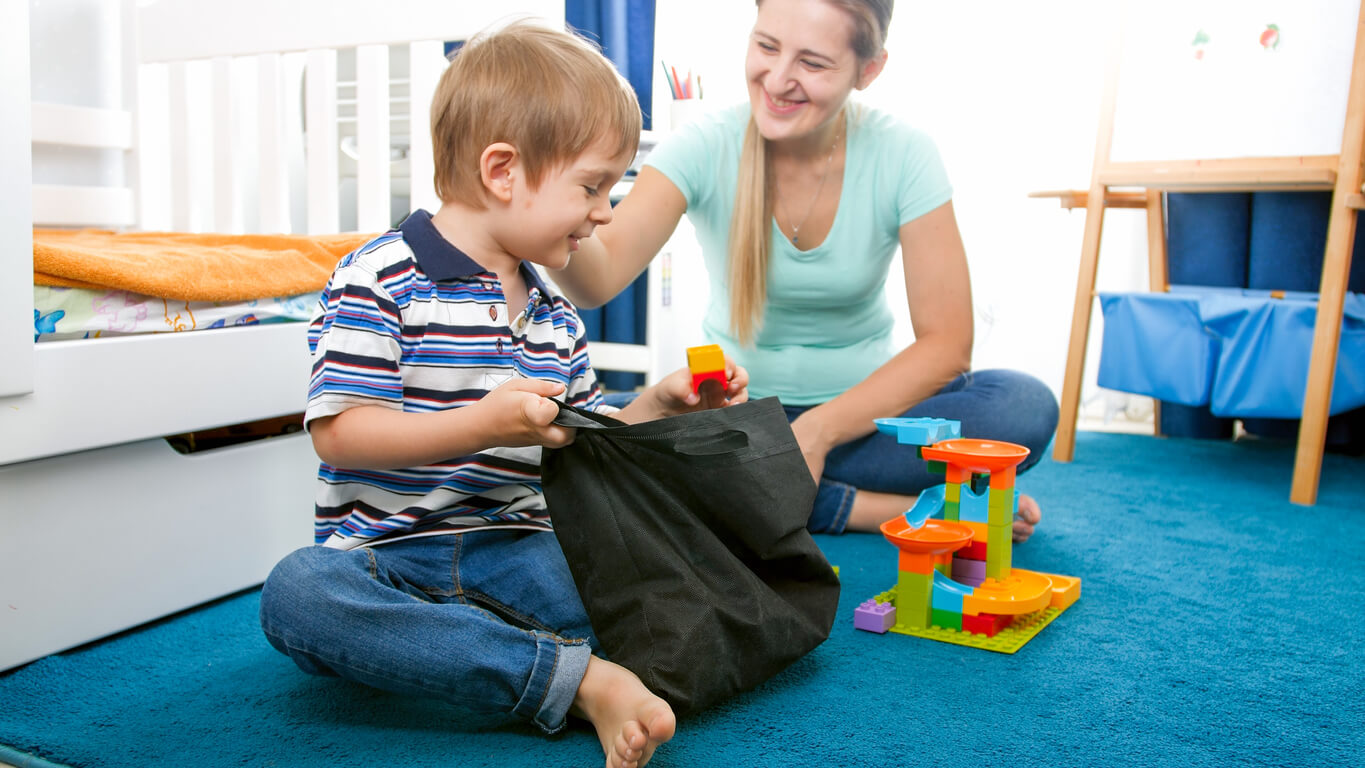6 Myths About Positive Education

“With this kind of education, at the rate we’re going, kids will end up telling their parents what to do.” This is one of the myths about positive education that many adults believe and that equates this type of education with debauchery, a lack of limits, and loss of authority.
However, positive discipline is just the opposite: it’s a type of education that’s based on respect and not on power; on decision-making and self-control, and not on fear and threats.
Let’s see what positive education is all about and how to apply it at home.
You may be interested in: Mutual Respect between Parents and Children
Positive education and its most common myths
Have you ever wondered if there’s a way to raise independent children who in turn, are attached and empathic with those around them? You’re in luck, because respectful parenting and positive education are all that and a little more.
Below, we’re going to share some of the myths that most frequently circulate around this way of educating little ones.
1. Positive education means not setting limits
This is absolutely false, as positive parenting recommends the use of limits to ensure the well-being of children. However, it discourages the arbitrary use of limits (“because I say so”), which appeals to authority due to the difference in age rather than respect.
On the contrary, positive discipline is in favor of meaningful limits, those that promote values and explain the reason for certain rules.
Many people understand limits as a synonym for abuse of authority, humiliation, physical punishment. That’s not what limits are, and positive education doesn’t endorse this type of practice either.
In positive parenting, boundaries are clear and consistent over time so children see consistency and know what to expect.

2. Positive education turns children into capricious and spoiled people, because there’s no “no”
This is another of the myths about positive education. The word “no” does exist and it is used. The only difference with respect to the authoritarian parenting model is that the first one tries to promote intelligent use of the term and not overuse. In other words, it’s necessary for parents to learn to use the word “no” as a punctual resource and not in an undifferentiated way or on any occasion.
Spoiling has nothing to do with dedication, proximity, or the affection that’s given to children. It has to do with making them think that they can get what they want, when they want, and how they want. And this has nothing to do with positive education.
Positive discipline also uses the knowledge provided by neuroscience, which specifies that better learning is achieved when the desired behavior is explained. That is, when we say “I wish you would do this” instead of saying “don’t do this”.
3. It ends up making children fragile
Educating from respect and from recognition can never result in a weak personality, quite the opposite. When we put this model into practice, we act on behalf of children, validating their feelings and teaching them to recognize that their emotions and those of others are important.
This does not make the little ones more fragile, but rather masters of themselves because it allows them to understand what’s happening to them and think about what to do about it.
Many people believe that positive education implies adopting good manners. In fact, this is partly so. Violence only produces more violence and humiliation and abuse translate into anxiety, behavioral problems, and a host of other negative consequences.
Then, we see all this transferred to school, personal relationships, and work environments. The “heavy hand” that many say must be applied at home is what children put into practice with their peers.
4. Only those who are experts on the subject can educate positively
No, positive education can be practiced by anyone, including parents, relatives, and educators.
Yes, it’s important to read about the subject in order to understand how it works and how to implement it. Above all, to grasp the meaning of this type of education and avoid falling into the myths surrounding it.
Finally, it’s true that putting positive education into practice requires a lot of introspection, questioning one’s own upbringing and one’s own beliefs. It requires getting away from customary arguments of the type “I was raised that way and I didn’t turn out so badly”.
Also, it takes a lot of patience to raise a child this way, as often the quickest way out seems to be yelling. However, what appears to work in the short term is not sustained over time: it only operates through reaction and not through learning and meaning.
5. It’s a way of criticizing what our parents did
No, the spirit of positive parenting isn’t about being judges of our parents or adults of reference. The goal is to improve what they did and dare to abandon certain vicious and ineffective patterns. Today, studies teach us new things and it’s important to be able to incorporate this learning into the education you give your children.
6. As there are no punishments, there’s no learning
Many adults believe that the only way for a child to learn is through punishment. However, does it really benefit someone if their child is left without playing with their friend because of their bad behavior?
Punishments lack a lesson and only focus on what they take away. Children must learn that there are expected or natural consequences to their actions and that they have nothing to do with missing out on doing something they want or feeling upset.
Punishments have more negative consequences than we imagine and only cause suffering in the child. And from there, nothing good can be built. They don’t work to promote learning or to achieve expected behaviors.
At the same time, as Álvaro Bilbao points out, evidence indicates the uselessness of punishment. If this were effective, the children who behave best would be those who receive the most punishment, and we know that this isn’t the case.

The benefits of positive education
Educating in a positive way seeks to promote values and to educate boys and girls who are responsible for their actions, who understand the reason for their actions, and who can take responsibility for their consequences.
In the end, this type of parenting is about helping them understand how it benefits them to behave in a certain way and not simply to escape punishment or anger. This also encourages the development of their autonomy.
You may be interested in: What are Positive Parenting Skills?
It sounds good in theory, but putting it into practice is hard
Sure, positive parenting is a challenge. Above all, because each child is different and what works in one case, doesn’t work in the other.
To this, we must add the personal history of each parent, their own difficulties, and the concerns of life. However, positive discipline allows us to recognize ourselves as imperfect, but in constant reflection, attentive to how we can improve the next time we seek to set a limit.
It’s not easy, especially because we’re part of a society that supports authoritarianism and adult-centrism, and both models are far removed from empathy and assertiveness. However, it implies much less conflict and burnout and also promises the development of better people. Let’s give it a try!
“With this kind of education, at the rate we’re going, kids will end up telling their parents what to do.” This is one of the myths about positive education that many adults believe and that equates this type of education with debauchery, a lack of limits, and loss of authority.
However, positive discipline is just the opposite: it’s a type of education that’s based on respect and not on power; on decision-making and self-control, and not on fear and threats.
Let’s see what positive education is all about and how to apply it at home.
You may be interested in: Mutual Respect between Parents and Children
Positive education and its most common myths
Have you ever wondered if there’s a way to raise independent children who in turn, are attached and empathic with those around them? You’re in luck, because respectful parenting and positive education are all that and a little more.
Below, we’re going to share some of the myths that most frequently circulate around this way of educating little ones.
1. Positive education means not setting limits
This is absolutely false, as positive parenting recommends the use of limits to ensure the well-being of children. However, it discourages the arbitrary use of limits (“because I say so”), which appeals to authority due to the difference in age rather than respect.
On the contrary, positive discipline is in favor of meaningful limits, those that promote values and explain the reason for certain rules.
Many people understand limits as a synonym for abuse of authority, humiliation, physical punishment. That’s not what limits are, and positive education doesn’t endorse this type of practice either.
In positive parenting, boundaries are clear and consistent over time so children see consistency and know what to expect.

2. Positive education turns children into capricious and spoiled people, because there’s no “no”
This is another of the myths about positive education. The word “no” does exist and it is used. The only difference with respect to the authoritarian parenting model is that the first one tries to promote intelligent use of the term and not overuse. In other words, it’s necessary for parents to learn to use the word “no” as a punctual resource and not in an undifferentiated way or on any occasion.
Spoiling has nothing to do with dedication, proximity, or the affection that’s given to children. It has to do with making them think that they can get what they want, when they want, and how they want. And this has nothing to do with positive education.
Positive discipline also uses the knowledge provided by neuroscience, which specifies that better learning is achieved when the desired behavior is explained. That is, when we say “I wish you would do this” instead of saying “don’t do this”.
3. It ends up making children fragile
Educating from respect and from recognition can never result in a weak personality, quite the opposite. When we put this model into practice, we act on behalf of children, validating their feelings and teaching them to recognize that their emotions and those of others are important.
This does not make the little ones more fragile, but rather masters of themselves because it allows them to understand what’s happening to them and think about what to do about it.
Many people believe that positive education implies adopting good manners. In fact, this is partly so. Violence only produces more violence and humiliation and abuse translate into anxiety, behavioral problems, and a host of other negative consequences.
Then, we see all this transferred to school, personal relationships, and work environments. The “heavy hand” that many say must be applied at home is what children put into practice with their peers.
4. Only those who are experts on the subject can educate positively
No, positive education can be practiced by anyone, including parents, relatives, and educators.
Yes, it’s important to read about the subject in order to understand how it works and how to implement it. Above all, to grasp the meaning of this type of education and avoid falling into the myths surrounding it.
Finally, it’s true that putting positive education into practice requires a lot of introspection, questioning one’s own upbringing and one’s own beliefs. It requires getting away from customary arguments of the type “I was raised that way and I didn’t turn out so badly”.
Also, it takes a lot of patience to raise a child this way, as often the quickest way out seems to be yelling. However, what appears to work in the short term is not sustained over time: it only operates through reaction and not through learning and meaning.
5. It’s a way of criticizing what our parents did
No, the spirit of positive parenting isn’t about being judges of our parents or adults of reference. The goal is to improve what they did and dare to abandon certain vicious and ineffective patterns. Today, studies teach us new things and it’s important to be able to incorporate this learning into the education you give your children.
6. As there are no punishments, there’s no learning
Many adults believe that the only way for a child to learn is through punishment. However, does it really benefit someone if their child is left without playing with their friend because of their bad behavior?
Punishments lack a lesson and only focus on what they take away. Children must learn that there are expected or natural consequences to their actions and that they have nothing to do with missing out on doing something they want or feeling upset.
Punishments have more negative consequences than we imagine and only cause suffering in the child. And from there, nothing good can be built. They don’t work to promote learning or to achieve expected behaviors.
At the same time, as Álvaro Bilbao points out, evidence indicates the uselessness of punishment. If this were effective, the children who behave best would be those who receive the most punishment, and we know that this isn’t the case.

The benefits of positive education
Educating in a positive way seeks to promote values and to educate boys and girls who are responsible for their actions, who understand the reason for their actions, and who can take responsibility for their consequences.
In the end, this type of parenting is about helping them understand how it benefits them to behave in a certain way and not simply to escape punishment or anger. This also encourages the development of their autonomy.
You may be interested in: What are Positive Parenting Skills?
It sounds good in theory, but putting it into practice is hard
Sure, positive parenting is a challenge. Above all, because each child is different and what works in one case, doesn’t work in the other.
To this, we must add the personal history of each parent, their own difficulties, and the concerns of life. However, positive discipline allows us to recognize ourselves as imperfect, but in constant reflection, attentive to how we can improve the next time we seek to set a limit.
It’s not easy, especially because we’re part of a society that supports authoritarianism and adult-centrism, and both models are far removed from empathy and assertiveness. However, it implies much less conflict and burnout and also promises the development of better people. Let’s give it a try!
All cited sources were thoroughly reviewed by our team to ensure their quality, reliability, currency, and validity. The bibliography of this article was considered reliable and of academic or scientific accuracy.
- Bilbao, Alvaro (2015) El cerebro del niño explicado a los padres. Plataforma Actual.
- Santa Cruz, Flor Fanny, & D’Angelo, Giuliana. (2020). Disciplina positiva para el desarrollo de las habilidades emocionales. Revista de Investigacion Psicologica, (24), 53-74. Recuperado el 09 de marzo de 2022, de https://www.scienceopen.com/document?vid=1a6a9fff-9581-456f-998b-645741cf4071
This text is provided for informational purposes only and does not replace consultation with a professional. If in doubt, consult your specialist.








